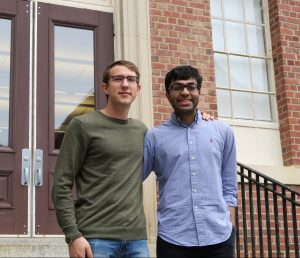 How did you spend your summer vacation? For six of our rising seniors, summer wasn’t a vacation — it was a time of intensive research into the workings of global financial markets. The research papers they’ve written are very impressive.
How did you spend your summer vacation? For six of our rising seniors, summer wasn’t a vacation — it was a time of intensive research into the workings of global financial markets. The research papers they’ve written are very impressive.
Peter Murphy and Amar Patel (pictured) investigated the accuracy of the monthly forecast of the change in non-farm payrolls in the US in their paper “Comparing Professional and Crowdsourcing Forecasts of NonFarm Payrolls”. The new twist to their work: they compare the forecasts of professional economists to forecasts generated by crowdsourcing.
Ruyang Chengan and Jin Xi investigate credit markets in China for their paper “Migration Status and Loan Default” . Migration status refers to the individual’s status within China, with a migrant being someone who has moved from his/her home to work in a distant location. The loan defaults in question are on personal loans extended by a Chinese commercial bank. Are immigrants more likely to default? It depends on their level of income. Low-income immigrants are significantly more likely to default than their low-income non-immigrant counterparts; high-income immigrants are significantly less likely to default than their high-income non-immigrant counterparts.
Zicheng Ye and Diana Song research the market for real estate investment trusts (REIT) in the US in their paper “Portfolio Diversification and Return Benefits by REIT Property Types”. Our financial-economics classes tell us that risk-averse investors benefit by diversifying their portfolios; Zicheng and Diana investigate whether this diversification benefit is evident in comparing different REIT property types (e.g., residential, hotel, or manufactured).
The Economics Department was able to support these research-intensive summers through the generosity of Herbert Brown Mayo. His gift to the Economics Department to fund undergraduate student research in the areas of financial economics and financial markets has triggered a flood of student creativity; you’ll find the paper from previous years here. Thanks, Dr. Mayo, for your support of this research opportunity!